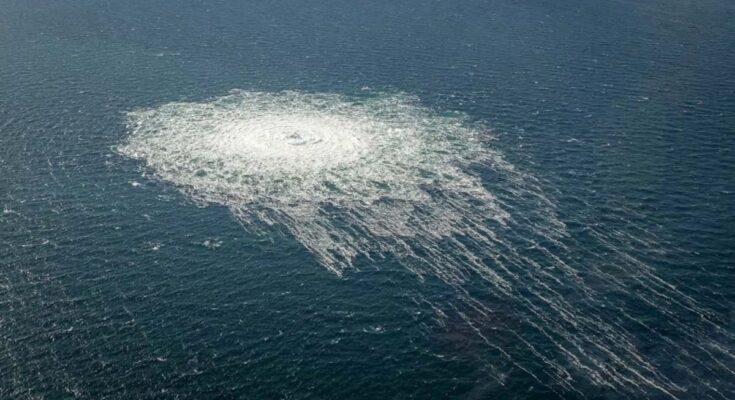It is not easy for German investigators to put together all the pieces of one of the most serious attacks in recent decades against an infrastructure in Europe (and bring all those responsible to justice). Nor does Germany have an easy time defending law enforcement while at the same time redeeming itself against countries like Poland or Ukraine, which have accused Berlin of complacency towards Vladimir Putin’s Russia for years.
The shock wave of sabotage, in the depths of the Baltic Sea, Nord Stream 1 and Nord Stream 2 in September 2022, arrives today. German authorities have already identified several suspects behind the explosions that damaged three of the four gas pipeline pipes connecting Russia to Germany without passing through the territory of Ukraine or Poland.
One of the suspects, a Ukrainian detained in Italy this summer, is on hunger strike, but Germany is confident the extradition will be successful. Another Ukrainian, detained in Poland in September, was released after a court in that country rejected his extradition request.
The case of Poland is different from that of Italy. Historic distrust of Germany is mixed with a heightened perception of the threat posed by Russia.
“In Poland, one of the few issues on which the vast majority of politicians and public opinion agree is a very critical assessment of German policy towards Russia,” says Polish historian Pawel Machcewicz. “Nord Stream is seen as a vivid example of too close economic cooperation between Germany and Russia, which helped Putin raise the money needed to launch the war against Ukraine.”
The puzzle begins with a semantic question. Was it an attack? A sabotage? Or a legitimate act of war against critical infrastructure for President Vladimir Putin?
According to the Polish judge who denied extradition and released the Ukrainian Vladimir Z., the operation that caused the destruction of the gas pipelines would have been, in normal times, an act of sabotage. But these are not normal times. The suspect’s country, Ukraine, is at war and the infrastructure was considered “property of the aggressor.” That is, from Russia. The problem, according to Polish Prime Minister Donald Tusk, “was not the destruction of the pipeline”, but “the fact that it had been built”.
bad conscience
The German government, led by Chancellor Friedrich Merz, finds itself in an awkward position. He may not agree with Tusk, but, perhaps out of bad conscience of what Nord Stream symbolizes in Poland or Ukraine, he avoids criticizing him. “The investigations are ongoing,” a German spokesman said, referring to the Polish and Italian cases. “We won’t speculate.”
Nicola Canestrini, lawyer of the Ukrainian Serhii K., detained in Italy, explained to EL PAÍS this week that he will appeal against extradition and that his client “has been on a hunger strike since (October 31), because he has been denied a healthy environment and adequate nutrition”.
The destruction of the gas pipelines was for Germany an attack on a project to which it had devoted years of political and economic effort and on which it had relied for gas supplies and prosperity. At the same time, when the pipes burst, Russia’s major invasion of Ukraine had already been underway for months, Berlin had broken its energy dependence on Moscow, and had opened a self-critical debate over Nord Stream.
“Ukraine is waging a defensive war against Russian aggression. This is beyond doubt,” explains Katja Gloger, co-author, together with Georg Mascolo, of Das Versagen (The Failure), a tireless analysis of the errors of German policy towards Russia. “Yet (the action against the gas pipelines) is punishable under German law. But Polish justice sees it differently. Two different systems collide here.”
“The Poles,” notes historian Machcewicz, “cannot understand why the German authorities want to criminally prosecute the perpetrators of the Nord Stream explosion: they should rather be praised and treated as heroes, as people who defend Poland and Europe from Russian imperialism.”
Tusk said the Polish justice system’s refusal to extradite the suspect sets a precedent that allows Ukraine to attack Russian interests anywhere in Europe. “Scandalous,” the Hungarian Foreign Minister, Péter Szijjártó, reacted on social media. “According to Poland, if you don’t like an infrastructure in Europe, you can blow it up.”
The consequences of Nord Stream divide Europe pro-Russian and pro-Ukraine. And they put Germany, at the same time in favor of Ukraine and the application of laws on its territory, in a dilemma.
The review of past errors is still ongoing. In this review it is possible that the chancellors promoting the gas pipelines, the Christian Democrat Angela Merkel and the Social Democrat Gerhard Schröder, will come out badly. After leaving power in 2005, Schröder held responsible and generously paid positions in the Russian company Gazprom, Nord Stream’s largest shareholder.
The media likes it Der Spiegel OR The Wall Street Journalrevealed that a team of six people, including active military personnel and civilians with maritime experience, carried out the sabotage. Furthermore, they had the approval of General Valeri Zaluzhni, the former head of the Ukrainian army, which the general, now ambassador to London, denied. Him Diary cIt was reported that Ukrainian President Volodymyr Zelensky had initially approved the plan, but then attempted to cancel it, without success.
The details – the months of preparation, the chartering of a yacht in the Baltic, the 50-mile dive, who knew what and when they gave the orders – will perhaps become clearer when the trial arrives. It could even end up being a trial against Germany itself. In those years, as Russia prepared for war, both countries intertwined their interests as never before. In Berlin many would prefer not to remove it.



